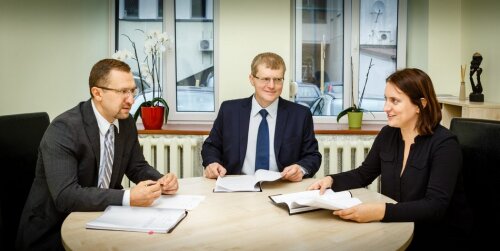Best Trusts Lawyers in Republic of Lithuania
Share your needs with us, get contacted by law firms.
Free. Takes 2 min.
Or refine your search by selecting a city:
List of the best lawyers in Republic of Lithuania
About Trusts Law in Republic of Lithuania:
Trusts in the Republic of Lithuania are a legal concept designed to allow assets to be held by a trustee for the benefit of beneficiaries. This can be a useful tool for estate planning, asset protection, and charitable giving. The legal framework for trusts in Lithuania is primarily governed by the Civil Code.
Why You May Need a Lawyer:
You may need a lawyer to help you establish a trust, navigate complex legal issues surrounding trusts, or resolve disputes related to trusts. Trust law can be intricate and having a legal professional by your side can ensure that your interests are protected.
Local Laws Overview:
In Lithuania, trusts are not as commonly used as in some other countries, but they are still recognized and regulated under the Civil Code. The law provides the necessary framework for setting up and managing trusts, including rules on trustee duties, beneficiary rights, and trust termination.
Frequently Asked Questions:
1. What is a trust and how does it work?
A trust is a legal arrangement where a trustee holds assets for the benefit of beneficiaries. The trustee has a legal obligation to manage the assets according to the terms of the trust agreement.
2. Who can create a trust in Lithuania?
Any individual who is legally competent and of age can create a trust in Lithuania.
3. What are the duties of a trustee?
Trustees have various duties, including acting in the best interests of the beneficiaries, managing the trust assets prudently, and keeping accurate records of trust transactions.
4. Can I revoke a trust in Lithuania?
There are circumstances where a trust can be revoked, but it depends on the specific terms of the trust agreement and the applicable laws.
5. How are trusts taxed in Lithuania?
Income generated by a trust may be subject to taxation in Lithuania. It is advisable to seek advice from a tax professional to understand the tax implications of a trust.
6. Can a trust be contested in court?
If there are disputes or disagreements regarding a trust, beneficiaries or other interested parties may seek resolution through court proceedings.
7. What happens to a trust when the trustee dies?
If a trustee dies, the trust assets may be transferred to a successor trustee or managed according to the terms of the trust agreement.
8. Can I include foreign assets in a Lithuanian trust?
It is possible to include foreign assets in a Lithuanian trust, but you may need to consider any international laws or regulations that could impact the trust.
9. How do I choose a trustee for my trust?
When selecting a trustee, it is important to choose someone who is trustworthy, competent, and willing to fulfill their fiduciary duties.
10. Do I need a lawyer to create a trust in Lithuania?
While it is not mandatory to have a lawyer create a trust, it is highly recommended to seek legal advice to ensure that the trust is structured correctly and complies with all applicable laws.
Additional Resources:
If you need further assistance with trusts in Lithuania, you may consider contacting the Lithuanian Chamber of Notaries or the Lithuanian Bar Association for a list of qualified legal professionals who specialize in trusts and estate planning.
Next Steps:
If you require legal assistance with trusts in Lithuania, it is advisable to schedule a consultation with a knowledgeable trust lawyer who can evaluate your specific situation and provide guidance on the best course of action. Be prepared to discuss your objectives, assets, and any concerns you may have regarding the creation or management of a trust.
Lawzana helps you find the best lawyers and law firms in Republic of Lithuania through a curated and pre-screened list of qualified legal professionals. Our platform offers rankings and detailed profiles of attorneys and law firms, allowing you to compare based on practice areas, including Trusts, experience, and client feedback.
Each profile includes a description of the firm's areas of practice, client reviews, team members and partners, year of establishment, spoken languages, office locations, contact information, social media presence, and any published articles or resources. Most firms on our platform speak English and are experienced in both local and international legal matters.
Get a quote from top-rated law firms in Republic of Lithuania — quickly, securely, and without unnecessary hassle.
Disclaimer:
The information provided on this page is for general informational purposes only and does not constitute legal advice. While we strive to ensure the accuracy and relevance of the content, legal information may change over time, and interpretations of the law can vary. You should always consult with a qualified legal professional for advice specific to your situation.
We disclaim all liability for actions taken or not taken based on the content of this page. If you believe any information is incorrect or outdated, please contact us, and we will review and update it where appropriate.
Browse trusts law firms by city in Republic of Lithuania
Refine your search by selecting a city.















